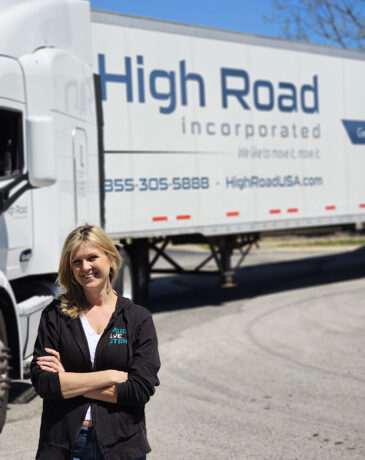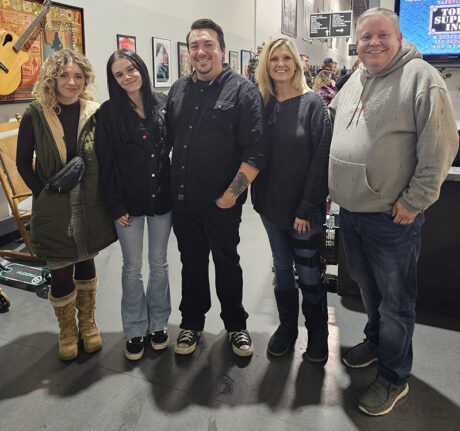
Sharon Lee is the founder and CEO of High Road Incorporated, which provides tour trucking services for the U.S. and Canada. She founded High Road in Nashville in 2016 with over two decades of experience in trucking. Originally rooted in corporate events, conferences, and trade shows, her idea to focus more on concerts and music led to the inception of High Road, which is headquartered in Franklin, TN, with a second location in Boston, MA. The company’s guiding philosophy is, “No road is long with good company.” High Road supports artists of all genres but has built a reputation working with indie bands and European and K-pop artists touring North America. Some of the artists that High Road has supported include Måneskin, H.E.R., Dropkick Murphys, Collective Soul, Switchfoot, Meshuggah, Sleater-Kinney, The Decemberists, and New Found Glory. Lee recently took some time to speak with PLSN about how she got started in the industry and what led her to opening High Road.
What got you into trucking?
I’ve always been in sales and marketing. Twenty-plus years ago, I was looking to make a change and ended up going to work for a trucking company. Not a company in the music industry.
Were you a driver?
Never! No, you want to avoid me even in my car.
What inspired you to start High Road, and what do you hope it brings to the industry?
I had been in trucking for about 20 years, mostly doing conferences, corporate events, and trade shows. I happened to be at a Jonas Brothers concert one night with my oldest daughter and saw the road cases, which made me think, ‘Wow, these look just like what we move for trade shows.’ That brought me into thinking about the music side of things, and I started exploring that a little bit.
Then the company that I was with was closing down, so I really wanted to get in and start pursuing trucking in the music industry. That is when I started High Road. I just loved the idea of starting a company that was something that I could really make my own. Having previously been with a company that was a franchise for a long time, it was very restrictive in terms of making decisions; the way that we could do things, and even down to how we treated the employees. With High Road, those decisions and practices are my own.
Talk about your experience, and reception from the industry, as a woman-owned trucking company.
It’s interesting. I understand and appreciate that women have a lot of challenges, whatever industry they’re in. But I have to say, I’ve always been treated respectfully, and very much as an equal in the music industry. There’s always been a place for me at the table. I don’t look for special treatment or to be treated differently as a woman. As a matter of fact, several years ago I gave up our woman-owned status. I do reference it, but I didn’t reapply for it because I just don’t see that it’s relevant. I think the most relevant thing for us is that we do a fantastic job, and that has nothing to do with me being a female. We do have male and female drivers on staff. Again, I do appreciate that other women may not have that experience, but, fortunately, that’s been my experience.
Talk about how you serve the industry and about your service philosophy.
We focus on the U.S. and Canada. We are considered more of a boutique trucking company, where we do artists that are one to 20 truckloads. We focus a lot on the artists that are playing smaller to mid-cap venues. We have a program that we call Tour Up, where we focus on those artists that are just growing into trucking from having been in a van, or they were in a bus with a trailer. They’re not really sure on how to handle a semi, how to pack it, what they need to know about crossing the border, what kinds of regulations there are. So, with Tour Up, High Road really holds their hand with the trucking part of the business and helps educate them. That’s just something that we do as part of our regular services.
Then the rest of it is we do focus on artists that are, like I said, the one to 20 truckloads. We do a combination of my drivers, which are generally the lead drivers, and then we also have contract drivers, which most of us in the industry do as well. We just work together as a team. Everyone that goes out is representing High Road. All our drivers are fully vetted, they’re all tour drivers. They know what they’re doing, and they operate as part of the team when they go out on the road.

Who was an early industry mentor or advisor?
I can’t say that I had one particular individual that mentored me, but I will say when I was interested in starting out in the music industry, I really didn’t know what I didn’t know. I knew trade shows and conferences. I didn’t know who controlled trucking for tours. I didn’t know the difference between a tour manager and a production manager. I just blindly reached out to people, and I had some really incredible people that were willing to spend time educating me more in the industry. One of them was Dan Russell, the co-founder of SoulFest up in New England, a large music festival and an artist manager, a concert and event promoter. Dan just really invested time and effort into sharing with me the music industry and what I needed to know. Another one was Ryan Lampa from TobyMac’s team. Ryan was gracious enough to spend time and answer a lot of questions. Ryan and I, we’re still good friends to this day. He runs a phenomenal charity now in Nashville that High Road supports. That’s just two of the very many people that really helped guide, support and encourage me in what I was doing.
Is there a piece of advice you received early on in your career you still find applicable today?
One of the things that I’d say—and I can’t say it was specific to any one person—but one of the things that I do remember from the early days, there was a lot of frustration. There were a lot of growing pains. There were definitely days that I went home and cried, but I think that failure and discouragement is just a part of business. You’re going to fail. There are going to be things you’re not going to do well; things you will never do well. I will never learn to drive a truck. Instead, you have to learn to overcome, to persevere, but also learn to find other people with the strengths that you don’t have. It is knowing that you need to surround yourself with good people, because you can’t do everything well, especially as a small business, as a new business, as a growing business, you can’t do everything well. So, finding those people who do it well and allowing them to work within their gifts, and that allows you to focus on what you do well.
Tell us a bit about some of the initiatives that are close to your heart that give back to the industry.
I’m a board member of Touring Career Workshop (TCW). I love working with Chris Lisle and with the team on the TCW board. I’m just really excited about what we’re doing. We’ve been supporting mental health in the touring industry for over 12 years, and I feel like right now it’s really in the spotlight. I think people are finally starting to understand that mental health is important and they’re taking it seriously. We have a great program called All Access, where we provide four counseling sessions free of charge to anybody in the touring industry, or their significant others. But we also have All Access On Site, which we launched last year, that provides mental health counseling at festivals and at concerts for people in the touring industry.
Another is Mechanics on a Mission, who we recently worked with to get a replacement vehicle for a crew member touring with Lainey Wilson. In partnership with ACM Lifting Lives and the Lainey Wilson team, High Road partnered with Mechanics on a Mission to gift a vehicle to a touring pro during a TCW Day Off event. Meg Miller, Tour Manager for Lainey Wilson, reached out and shared that a member of their crew’s engine had blown and was in need of a vehicle. I reached out to Brian Sweatt, Executive Director of Mechanics on a Mission, to see what we could do to help. Working with these organizations reaffirms the positive impact we can make when the industry comes together.
How do you see the state of trucking industry today, and what are some of the key changes you’ve seen over your time in it?
Setting COVID aside, when live music came back, it came back fast and furious. One of the things that I have seen over the years that I think is interesting, it almost doesn’t matter economically what’s happening in the world because live music is a form of entertainment. When people are struggling or having trouble—even when the troubles are financial—people want to be entertained. People want that escape. So, they’re still going out and they’re seeing concerts and they’re going to live music events. Maybe they’re not buying the VIP tickets, but they’re still buying tickets. I just don’t see that ever really going away. But I do see some changes, maybe artists playing smaller venues instead of playing arenas. But I think right now, we’re still going really strong. I think there’s a high demand for trucking still, as well as buses and production equipment. We’re still hopeful that more people will come into the industry, especially as people—not my age, maybe a little bit older than me—start to retire. Right now, we see a lot of demand and things are really going strong in the live music industry. It is great to be part of this industry and I love working with the High Road team and our clients.
For more information, visit www.highroadusa.com


